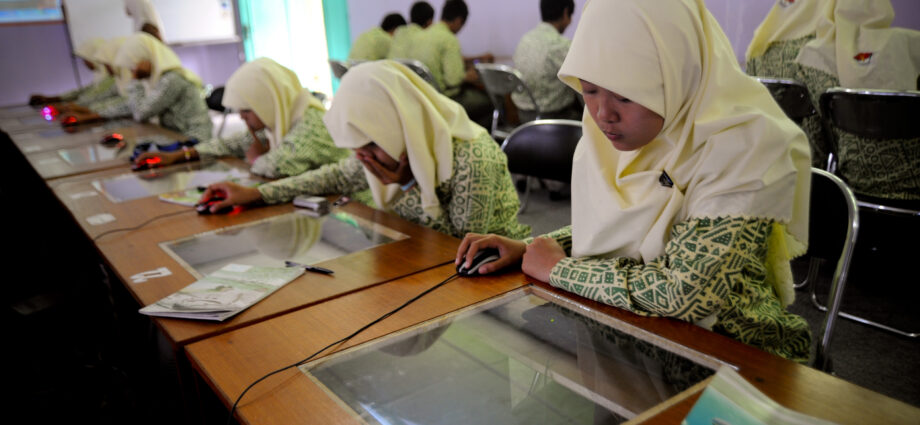
An AI-powered world in which teachers have more free time and more information on how to help students isn’t far away, but ethical challenges must be managed.
By Hammam Riza and Taufik F Abidin
March 8, 2024
Imagine a future where classrooms are dynamic AI-powered learning spaces, where every student has a personalised experience.
AI can free up teachers to focus on students individually by streamlining administrative tasks, while the learning analytics can provide valuable insights into student performance, helping educators identify areas where intervention and support are needed.
AI also can provide access to quality education in remote and underserved areas, such as in Indonesia’s West Banyak island, 200km west of the city of Medan.
As we embrace AI in education, ethics must be at the forefront of all discussions to ensure responsible implementation.
One of the main ethical concerns is safeguarding student privacy and data. Educational institutions must have clear guidelines and regulations for the responsible use and management of student’s data within AI-driven platforms before they are all rolled out.
Transparency and trust are also vital aspects of ethical AI implementation. Educators and students must understand how AI systems operate, how they make decisions and how they impact the learning process. Transparent AI systems foster confidence in their use, promoting meaningful engagement between students and technology.
Addressing algorithmic bias is a critical ethical challenge. AI systems are only as unbiased as the data they are trained.
If AI algorithms are fed biased data, they can perpetuate and amplify existing inequalities. Ethical AI practices involve critically examining the data and algorithms used in AI systems to spot and fix potential biases, ensuring fair and unbiased treatment of students from diverse backgrounds.
Regulating AI in education requires a team effort, including policymakers, educators, researchers and industry experts. Together, they can develop comprehensive regulation balancing innovation with ethical responsibility.
Initiatives like UNESCO’s Readiness Assessment Methodology (RAM) and the Ethical Teacher Training Course (ETTC) are crucial in equipping educators with the necessary tools and knowledge to navigate ethics challenges in education.
Practical pilot projects and case studies help explain the impact of AI in specific educational domains.
By piloting AI applications in classrooms, countries like Indonesia can gauge the effectiveness of AI-driven initiatives, identify challenges, discover solutions and refine strategies. Learning from these practical experiences will facilitate the fine-tuning of AI integration and ensure its alignment with Indonesia’s educational goals.
Regulating AI in education is important for responsibly developing AI and ensuring its potential is harnessed to improve society.
By prioritising human values, data privacy, transparency and inclusivity, Indonesia can pave the path for ethical AI governance in education. Ongoing collaborative discussions, and continuous policy updates will refine ethical frameworks, guiding AI-driven education toward a positive societal impact.
Embracing ethical AI practices, Indonesia can responsibly harness AI’s potential to create a future-ready and inclusive education system that empowers learners, fosters innovation, and drives societal progress.
Prof Hammam Riza is the President of the Indonesia Collaborative AI Association (KORIKA), Chairman of the Institute of Indonesia Technology Auditor (IATI), Vice President of the ASEAN CIO Association, a senate member of the Indonesia Internet Organization (PANDI), and an Honorary member of the Indonesian Telecommunication Society (MASTEL). He can be found on Twitter and Linkedin.
Prof Taufik F. Abidin is a Professor in Computer Science and Chairman of the Institute for Research and Community Services at Universitas Syiah Kuala, Banda Aceh, Indonesia. He is a member of the Indonesia Collaborative AI Association (KORIKA), IEEE, APTIKOM, and the Indonesian AI Society (IAIS). He can be found on LinkedIn.
Subscribe to our newsletter.
Originally published under Creative Commons by 360info™.


